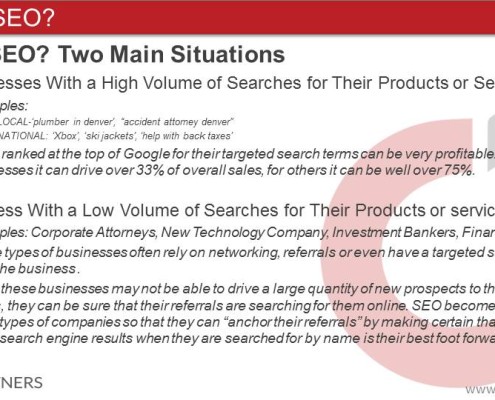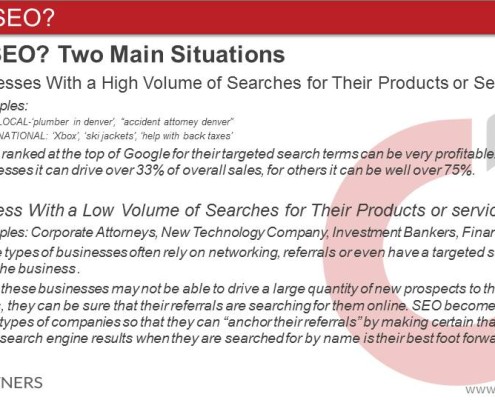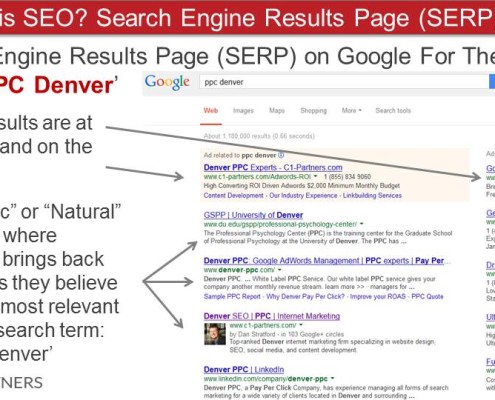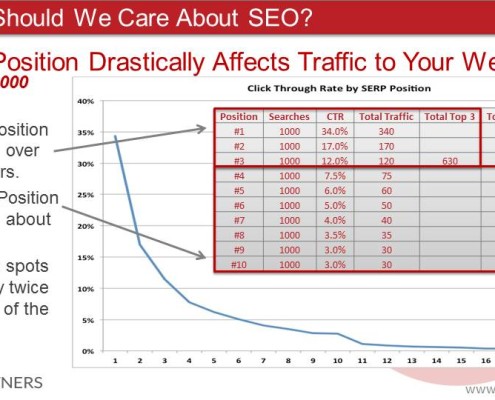The Overlooked Power of Paid Search for Manufacturers
Read Storyby RefractROI
Internet Marketing professional video & transcript
As I mentioned, today we’re going to talk about “what is SEO”, a little bit about “why SEO”, and we’re briefly going to cover on-site SEO because this presentation is about off-site SEO. I’ll give you some tools or resources that we use for SEO analysis and specifically off-site SEO analysis.
(On-Site SEO Video is Available Here)
When we ask Wikipedia they say, “Search Engine Optimization” of course, SEO, “is the process of affecting the visibility of a website or a web page in a search engine’s natural or unpaid organic search results.” So doing things to a website on the site and off the site to help it rank better.
Why would you do SEO? According to Wikipedia the higher you rank, the more frequently you appear and the more traffic you get. SEO may target different kinds of search, image search, local search, video search, academic search. There are even specific websites where within that website you conduct a search.

When I look at SEO I run across businesses with two main types of situations. One is businesses with a high volume of searchers for their products or services, and examples of this would be a “plumber in Denver,” “accident attorney in Denver”; national searches like “Xbox,” or, “ski jackets,” or, “help with back taxes.” These are businesses that if they are ranked at the top of Google for these types of searches and they sell those types of products or services, it’s very profitable for them, and they can drive over a third and sometimes over three quarters of their sales will come from their search engine optimization efforts.
However, there are businesses with a low volume of searches for their products or services, so corporate attorneys, or a new technology company where the product is so new that guess what, nobody’s searches for it because they don’t know it exists. It also may include investment bankers, or financial planners, essentially any type of business that historically has relied on networking, referrals, or even they have to have a targeted sales team to drive their sales.
While these types of businesses are not going to necessarily get people searching for their products or services all that often, what is important for them is that they anchor their referrals, which means that when we get a referral, when a sales person introduces themselves to a prospect and that prospect researches them online, what comes up in their results? Bad SEO means that wrong address, wrong phone number, wrong information. Sometimes bad information about your business appears on the first page or two of the search results.

If you do a good job of SEO, even in this type of situation, then when people search for you by name, they’re going to find your website, your LinkedIn, your Facebook, your Twitter, pictures about your business, stories about your business, press releases about your business. They are going be very happy that they were referred to you. The good news is if you’re in this type of situation with a low volume of search for your product or service and you’re just trying to anchor your referrals, it’s a lot easier than competing for competitive search terms.
Let’s talk about SERP, the “search engine results page”. Here’s an example of a search engine results page, and all that means is the results that the search engine brings back on the page, based on the search that was typed in. In this case we have “PPC Denver” stands for Pay for Click Denver. The page results appear at the top and right and you usually see zero, one, two, or three results in the paid at the top, and then you see then begin on the right. Sometimes there’s no paid search results. But if the term has any kind of competitiveness you will see a paid result. Below that is the organic results. This is where Google brings back the websites that they believe to be the most relevant based on the search that was typed in at the search engine.

As you can see here I will brag for a second: we setup of Google Adwords to pay for the click “PPC Denver”. We have paid to be here because we get good business from this placement. We also optimize our websites. We come up in the organic. I would argue that we’re in position two here, which is awesome, because this a .edu site, so a school site, whereas this here is the first service provider that appears. In other words we have only one competitor above us. That’s pretty darn good for SEO. We do a lot better than that for “Denver SEO” & “SEO Denver” searchers where we usually show up at the top of the organic.
Why should you care about SEO and SERP position? This is why. This is data that we’ve confirmed with our clients by researching our Google Webmaster Tools data and finding out guess what, if you’re in position one, you’re going to average 34% of the clicks will come to your site. That means for every 1,000 searches, you’re going to get 340 visits to your website. If you’re in position two on the search engine that drops down to 17% so you get half the traffic. If you’re position three it drops down a little bit. By the time you get down at the bottom in the first page, what ends up happening is you get one tenth of the traffic or worse than what you get at the top. Then, when you get to page two it drops again by 2 thirds.

When you talk about SEO, goal number one is, “let’s get ranked.” Number two is, “Let’s get ranked on the first page.” and finally, “Let’s get up in this top three,” because when you’re in the top three you’re part of a group that gets twice as much traffic as the bottom seven. This is a great place to be as a business, is in that top three.
Two major SEO factors we already mentioned, on-site SEO, which is really what you do on your website. Off-site SEO is what you do off of your website that connects to your site directly or indirectly. On-site SEO factors, we covered this in the last presentation. I’ll cover this quickly.
Hey there, anything we can assist with?